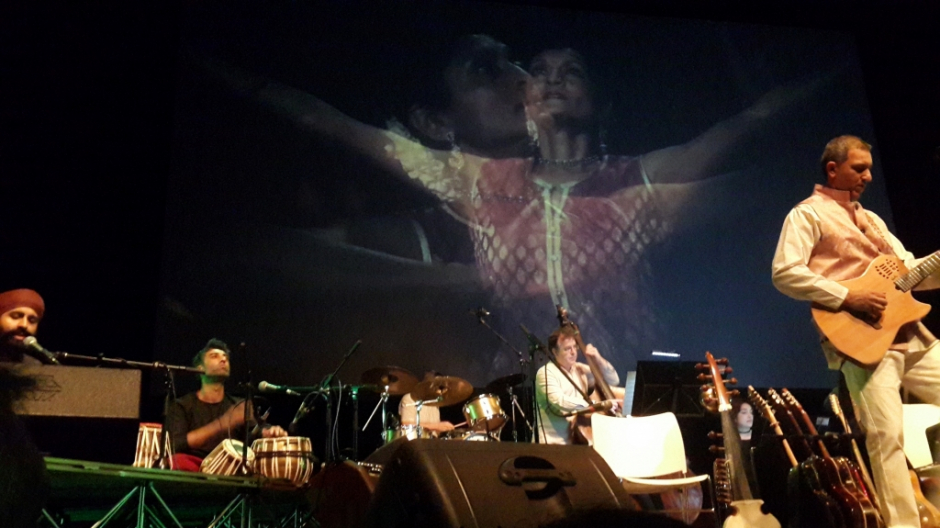After a brief pre-concert talk with Aziz Ibrahim and his friends, the hugely anticipated big show finally started at 7:30 sharp with a bang. Teaming up with Manchester Camerata (‘probably Britain’s most adventurous orchestra’), Aziz, a proud Manchester native, wowed big time in front of an electrified Mancunian crowd on HOME soil. Special guests of the performance featured Kaviraj Singh playing the santoor (a hammered dulcimer originally from the mountains of Kashmir that is used widely in Islamic Sufi devotional and Hindustani classical music) and Dalbir Singh Rattan playing the tabla. Both Kaviraj Singh and Dalbir Singh Rattan also doubled as vocalists.
The fantastic night offered a radical orchestral interpretation of original compositions and Aziz’s debut album entitled Lahore to Longsight, enabling the keen audience to truly get up close and personal with Aziz and his master collaborators’ virtuoso performance. Situated within the backdrop of the partition of India, the album charts his father’s epic journey from Lahore – the second largest city in Pakistan – to Aziz’s birthplace Longsight in inner city Manchester. More importantly, his album tells an intriguing and highly personal story, a story that concerns the path towards self-identity and acceptance for a young son torn between drastically different cultures and values growing up.
This year marks the 70th anniversary of the partition of India in 1947, an eventful year that witnessed the conclusion of the British Raj and the independence of modern-day India, Pakistan and then Bangladesh. Unsurprisingly, this one-off event at HOME came as part of an array of celebratory activities in commemoration of the partition in Manchester and beyond. Now 70 years on, such a historical event is one that both calls for heartfelt rejoicing and at the same time sober recollection and deep reexamination.

This therefore highlights the need for a bit of contextualisation in order for the audiences to better understand and appreciate the myriad commemorative activities held all over the UK and further afield. In 1947, the pre-existing inter-religious tensions between the Hindus and Muslims were further stoked and gradually escalated into full-blown massacres with the drawing and subsequently implementation of the (in)famous Radcliffe line demarcating India and Pakistan. The partition in the not-so-distant past brought about countless untold sufferings and tragedies to the ordinary people, effectively sowing the seed of hatred and mutual suspicion between India and Pakistan now and all too likely for generations to come.
This historical event, as a result, gave rise to waves of post-1947 immigration to the UK, constantly shaping the British society in multifarious and profound ways. These, for example, include Punjabi immigrants and Bangladeshis (mostly hailing from the Sylhet region) who settled respectively in West London and East London and Pakistanis who migrated to places like Birmingham, Manchester, Bradford and Luton. This, without doubt, has had significant demographic and far-reaching social implications on the fabrics of the British society, not to mention the great enrichment of the British food with subcontinent or ‘desi’ cuisines and of the British music culture as this event has abundantly shown.
An excellent storyteller and a bit of a stand-up comedian, Aziz recounted his fond personal and family stories as a young man growing up and pursuing a musical career as he introduced his tunes in a touching, poignant yet jocular way on stage. Most memorably, for instance, the music Middle Road was inspired by his father’s somewhat philosophical admonition that he and his brothers should avoid extremes and stick to the middle way instead. Also interestingly, Aziz explicitly divulged his hatred for the seemingly anachronistic word ‘fusion’ on stage. However, as a member of the uninitiated, I will insist on calling the performance an excellent fusion of various genres and styles, for lack of a better and more apt word. His unique experience growing up between cultures and amongst various musical traditions no doubt left an indelible mark on his understanding of music, making him truly one of a kind as a musician. The virtuoso performance concluded on a highly emotional and personal note with Aziz’s brothers (the supposedly unannounced guests) being invited onto the stage. The last tune brought the absolutely sterling performance to a fever pitch, leading to minutes of standing ovation from the impressed Mancunian crowd.
The import of the Lahore to Longsight performance, however, goes far beyond merely a musical feast. This particular event provides invaluable food for thought, contributing to perhaps thousands of individually different yet shared and heart-wrenching partition stories getting told and retold in the world. More importantly, there are perhaps rarely any more opportune occasions for a sober reflection on and calm re-examination of the nostalgic (for some) yet highly weighty and poignant topic vis-à-vis British colonialism as well as its far-reaching colonial legacy and impact that are still very much reverberating and shaping our world in not insignificant ways (one needs to look no further than the Middle East, Hong Kong, Kashmir and not least the plight of the Rohingya Muslims).

In addition, there are also activities galore going on in memory of the historical event of the partition in Greater Manchester. These include Celebrating Ganesha and Memories of Partition at the Manchester Museum, Mehreen Murtaza, Neha Choksi, Risham Syed, Waqas Khan and South Asian Design at Manchester Art Gallery, RAQS Media Collective, Raquib Shaw and Beyond Borders at Whitworth Art Gallery, amongst many others.

